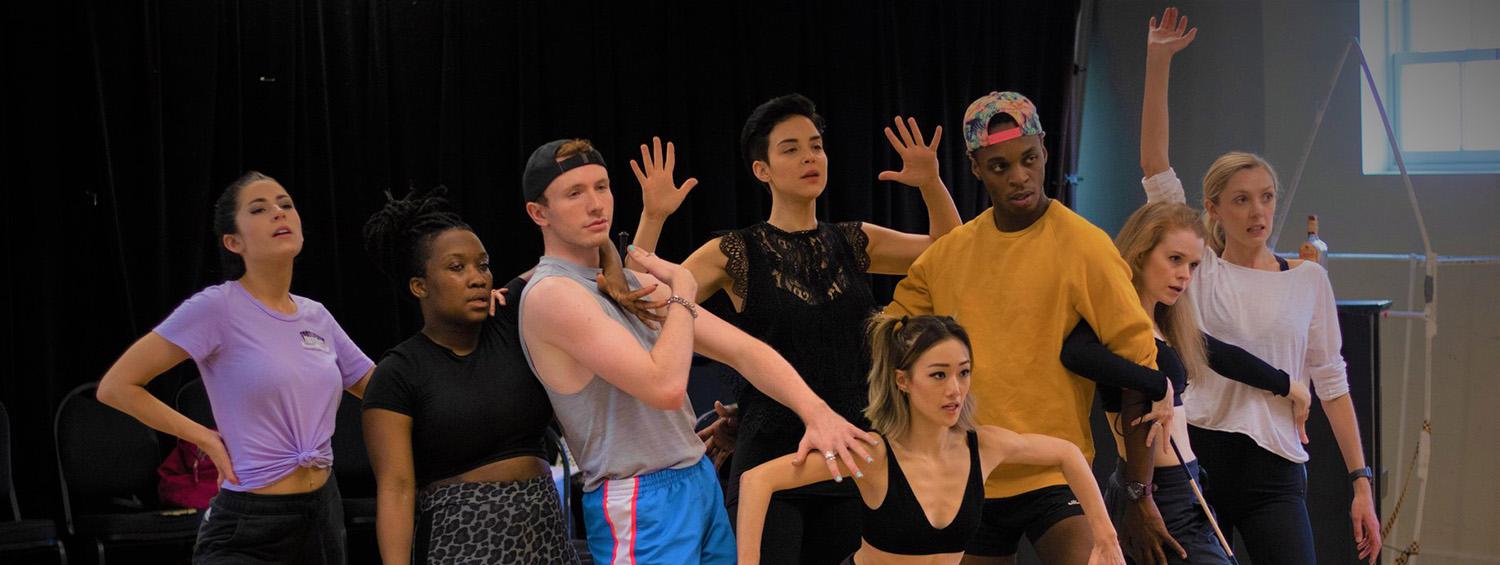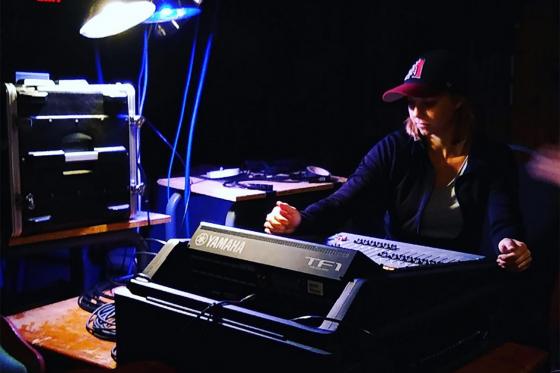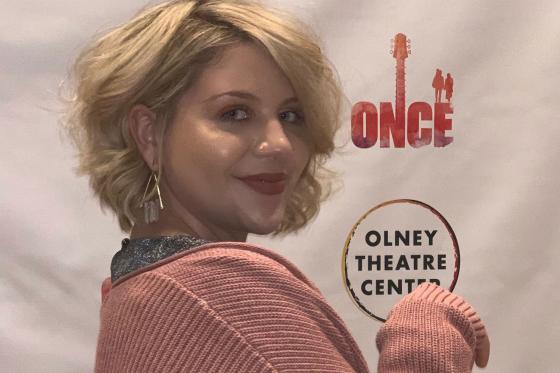“Willkommen, bienvenue, welcome” Alexandra Silber to the blog! Silber is a veteran of Broadway (Fiddler on the Roof, Master Class, Arlington, Hello Again, She Loves Me) and the West End (Kiss Me Kate, The Woman in White, Fiddler on the Roof, and Carousel). She is also an accomplished writer, critical thinker, and story-teller. Currently, she is gearing up to play Sally Bowles in Cabaret which opens next week! Before Cabaret opens, I wanted to see the inner workings of her prepwork for this charming and peculiar character, and also get to know more about her background as a writer.
Where are you from?
I was born in Los Angeles and grew up outside of Detroit, Michigan (we moved there when I was 9).
I was so fortunate to go to Interlochen Center for the Arts for summer camp and the last two years of high school, and went on to study Acting at the Royal Conservatoire of Scotland in Glasgow.
What has been your process of preparing for Sally Bowles?
When it comes to creating characters as a theatre artist, I (like many actors) like to think of rehearsal as a “studio” — the way visual artists might regard their time experimenting and crafting their artwork. With that in mind, I like to think of myself as having a varied “toolkit” at my disposal to help aid my creation. Based in really thorough research and fueled by my imagination, I have so many wonderful techniques at my disposal to play around with.
But I have found that I often prefer to create characters from the “inside - out,” if you will. (This method was made famous by Stanislavski around the turn of the century in Russia, and made its way around Europe and eventually to America where it was utilized and transformed by American Naturalism pioneers such as Lee Strasberg, Stella Adler, and Sanford Meisner, and later Uta Hagen and many others).
The “inside - out” theory merely means you start working from the inner world of the character (the “inside”) and see how that affects the behavior and actions of that character, I often prefer to start with their inner life and backstory and a lot of psychological questions about what got this character to this place in time and geography.
But interestingly, with Sally Bowles I have been working in the opposite direction! Reacquainting myself with a number of physical theatre techniques that help me understand who Sally is by starting with her behavior in the present—and allowing the physicality to fill in and inform her inner world and backstory. It’s been exhilarating and extremely evocative to work this way, because for Sally, her persona is THE most important thing in her life at this point in time. We know very few facts about her and she even says to Cliff when they first meet:
“Oh Cliff. You musn’t ever ask me questions. If I want to tell you anything, I will.”
I can’t imagine creating such an enigmatic character (for whom so much of her reality is put-on / theatrical / false) in any other way. And I am finding that as I craft and hone her behavior, her voice, her fashion sense, her actions, her choices— her psychology and her backstory are revealing themselves to me like a dark and twisted Easter egg hunt.
Who is Sally Bowles?
As I’ve stated above, Sally is an enigma in almost every way.
In Christopher Isherwood’s 1937 novella Goodbye to Berlin (on which the musical Cabaret is based) Isherwood famously introduces Sally by writing:
A few minutes later, Sally herself arrived. "Am I terribly late, Fritz darling?".... Sally laughed. She was dressed in black silk, with a small cape over her shoulders and a little cap like a page-boy's stuck jauntily on one side of her head.... I noticed that her finger-nails were painted emerald green, a colour unfortunately chosen, for it called attention to her hands, which were much stained by cigarette smoking and as dirty as a little girl's. She was dark.... Her face was long and thin, powdered dead white. She had very large brown eyes which should have been darker, to match her hair and the pencil she used for her eyebrows.
What we do know about her is that she is a relatively young woman we are told is from England. She is one of the star performers at the Kit Kat Klub in Berlin in 1930 at the height of the liberal all-night-party that was the Weimar Republic in Germany between the world wars (just before Hitler and the Nazis seized Germany). The Kit Kat Klub embodies Berlin at the time: the German epicenter of sexual liberation, freedom, and decadence; and Sally is never happier and more filled with purpose than when she’s performing on the Kit Kat stage.
She is not-necessarily conventionally talented (though she does have some kind of “star quality”), she is liberal with her values, she is sexually promiscuous, terrible with money, and appears to have a terrible addiction to gin and being the center of attention.
But despite all these slightly repugnant qualities, there is something about her that is charming, irresistible, intoxicating, and even warm.
Why is the story of Cabaret important in 2019?
I can actually think of no other classic story more important than Cabaret in 2019.
Cabaret is the story that details the humanity (or lack thereof) of Berliners at the dawn of Nazi Germany. It paints vivid pictures of struggling Germans who long for a better country, and are torn apart by a struggling economy, floods of immigrants, Nationalistic pride and an utterly divided political climate. … sound familiar?
Berliners in 1930 did not realize that the Nazi Party was one to be taken seriously. They were shocked by the uprising in Nazi power. And while the Nazis were anti-semitic and absolute extremists, in 1930, the horrors we associate with their regime had not happened yet. No regular citizen could fathom how far the theories would go. What they proposed was a practical (if radical) economic solution for a desperately struggling country.
But the true message of Cabaret is that of the price of COMPLICITY.
What does it mean to “do nothing?”
What does it cost us all?
Just like in 1930s Germany, we as 21st century Americans do not live in a country or in a world where we can be neutral. Our human rights are being attacked every day. Do we live in an age where it is possible to be neutral? Do we live in a time where we can sit tight and think “governments come and governments go…?” If we remain disinterested, inactive and silent, must we hold ourselves accountable as being complicit in the actions being taken by not only lawmakers and our government, but by our friends and neighbors?
I’ll use Fred Ebb’s own words from Cabaret:
“What would you do?"
Can you tell us more about the story behind writing After Anatevka?
I have been so fortunate to play Tevye’s two oldest daughters in the musical Fiddler on the Roof on both sides of the Atlantic— first as Hodel in the 2007 West End revival, and most recently as Tzeitel, in the 2016 Tony-nominated Broadway revival.
When I played Hodel in London, I had recently lost my own “Papa” to a long battle with cancer. Every day for two years, I spoke Hodel's final words “Papa, God alone knows when we shall see each other again…”
Each time as Hodel said goodbye, so did I.
I was deeply haunted by Hodel’s courage, faith, and fierce intellect, ignited by her true love for the Socialist university student: Perchik. In the second act, Hodel boards a train to join Perchik in a Siberian prison... and we never hear from her again…But I needed to know what happened to her.
Thus, I began writing After Anatevka, an original piece of historical fiction to chart Hodel's journey. It truly was a journey from stage to page.
After Anatevka really offers some chilling contemporary parallels, with a central message of faith and hope. It is “Shalom Aleichem meets Dr Zhivago” — oral tradition meets sweeping love story, with a brilliant and strong female protagonist.
What has been your favorite production you have worked on?
With very no hesitation, I can say that working on Camelot last year at Shakespeare Theatre Company right here in DC was the highlight of my career thus far. Everything about the experience from the role itself (Guenevere), to my incredible company of fellow actors (my co-stars in particular, Ken Clark and Nick Fitzer), the creative team and theatre staff, and above all our director Alan Paul (with whom, including Cabaret, we’ve shared four collaborations). It was a dream come true— the kind of feeling you dream about when you are a young person just falling in love with theatre; the feeling you hope professional theatre feels like.
Check out Alexandra Silber’s Website: www.alexandrasilber.net
Box Office: 301.924.3400
Open Wednesday - Sunday: 12:00 PM - 6:00 PM






